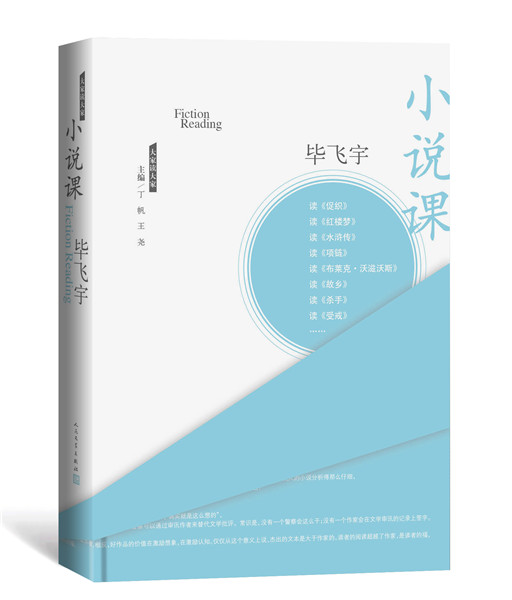Source: China Daily (3/3/17)
He makes reading accessible
By Mei Jia

When writer Bi Feiyu landed in Beijing recently for four book events and to do a show on China Central Television’s hit program Readers, his presence created a stir among his fans, not unlike the one in London five years ago when he was there for an international book fair.
The winner of the 2010 Man Asian Literary Prize has a new book, Fiction Reading, a collection of magazine columns on his understanding of fiction classics, both Chinese and foreign.
The columns, which were first published in the Zhong Shan magazine, are based mainly on Bi’s literature lectures at Nanjing University since 2013, where he is a professor.
His reviews of world-class writers, using a colloquial and humorous touch, are wildly popular online.
“I love to chat about novels. And, I used to have a ‘bad’ reputation for that because I would keep my chat partners for too long,” says Bi.
But to him, fictional creations are like artifacts that he can examine carefully at any time and play with.
He played a game with his audience at Tsinghua University on Sunday, inviting them to turn the Tang Dynasty (618-907) poet Li Shangyin’s four-line poem about evening rainfall into a novel.
“Under Li’s 28 Chinese characters in the poem, there lies a One Hundred Years of Solitude-like story that spans the passage of time,” he says.
At his previous lectures, he played other games with his audiences, like changing all the major characters’ names in the French short story writer Guy de Maupassant’s The Necklace into Chinese ones.
Bi calls Ernest Hemingway a tough guy, which means he chooses stronger characters’ point of views to tell stories, as in The Killers.
“Hemingway writes in a way that is enabled by his own character, and even by his strong body. If you ask Franz Kafka to write in Hemingway’s style, he would pass out and what we would be left to do is to pinch Kafka’s philtrum (a method of traditional Chinese medicine) to help him come around,” says Bi.
Bi says that language is the key when it comes to the quality of novels, and that Leo Tolstoy is a master of party scenes.
Also, Bi prefers to speak more about the logic, instincts, character and intelligence of the writers who produced classic works, when analyzing their writings, saying: “It’s far better than analyzing novels using social backgrounds, paragraph summaries and the key point”, which is a common practice in schools.
Defending his style, he says: “You can not read a novel with a telescope.”
He also believes that a careful reading of the text helps provide the answer for “how and why classical writers write so well”.
Commenting on Bi’s new work, Zhao Ping, an editor with the People’s Literature Publishing House, the book’s publisher, says: “His reviews and analyses are very interesting and offer readers not only a satisfying work, but the book convinces them completely.
“After reading him, you feel that he not only beats you in terms of reading and understanding a fiction text, but also makes you eager to learn more from him.”
Meanwhile, Ding Fan from Nanjing University and Wang Yao from Suzhou University, the chief editors of the book, say that the publisher is planning a series of similar books by celebrated writers Zhang Wei, Yan Lianke and Su Tong.
In the foreword of the book, they write: “Writers’ takes are different from the dogmas prevailing in Chinese schools and are free from rigid literary theories. They are full of life and details.”
The chief editors also say in the foreword that they believe they are paving a new path for literary education in the country.
Bi agrees that his 30 years of writing enables him to analyze texts better.
Separately, one trend in China that could enable similar books to gain popularity is the fact established writers are often invited to university campuses.
For instance, Wang Anyi has been to Fudan University; Yan Lianke and Liu Zhenyun have taught in Renmin University and Mo Yan and Su Tong have been to Beijing Normal University.
Asked if literature writing can be taught, Bi says: “Reading is where I find my main source of inspiration.”
Bi also says that reading is how he sharpened his instincts.
Bi, who was born in 1964 in Jiangsu province, says he started writing poetry in the 1980s and turned to novels in 1987.
His father, a Chinese teacher, was a source of early inspiration, he says.
“My father showed me that The Necklace had a powerful ending at age 8 or 9.”
Bi’s latest work reveals a lot about his reading and writing experiences, about how he created the character Yu Xiu, the younger sister of Yu Mi in Three Sisters, and his life as a fiction writer.
Bi’s novellas The Moon Opera and Three Sisters, and novel Massage have won him prestigious awards both at home and abroad, including both the Mao Dun and the Lu Xun literature prizes, and the works have been translated into many languages.
Finally, to sum up Bi, the PaperRepublic website does it well when it says: “He often writes like he talks. His prose can be meandering and his metaphors indulgent, but his ability to reproduce colloquial language in print and his interest in ‘commonplace’ characters means that his work presents a wealth of truly relevant human detail to the reader.”
Contact the writer at meijia@chinadaily.com.cn